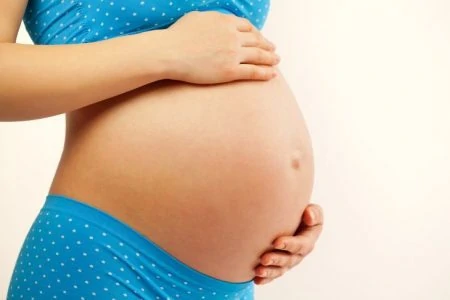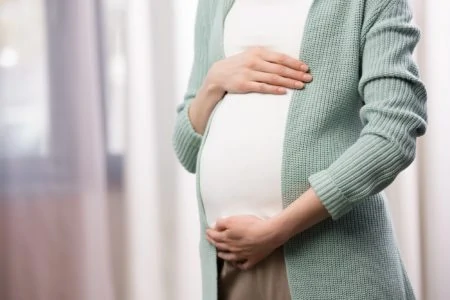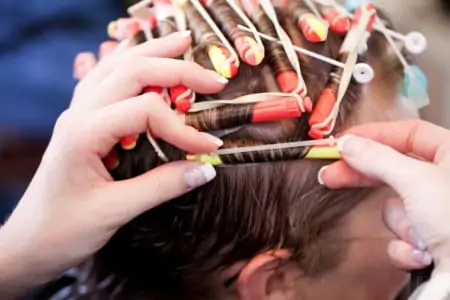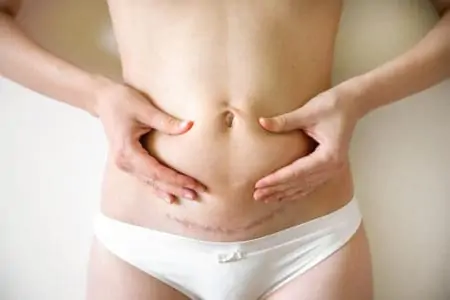We’ve been there — that moment when you stand in front of the mirror and no longer recognize your belly button. You may not have expected your “innie” to become an “outie,” and we know it can be a little alarming.
Your belly button will go through a series of changes during your pregnancy, most of which are completely normal. The good news is most of these changes are temporary, and your pre-baby belly button should eventually return.
In this article, we will discuss what causes belly button changes during pregnancy, what you can expect, and what you can do about it.
Key Takeaways
- Belly button changes during pregnancy are normal, often “popping out” due to the expanding uterus and stretching skin.
- Most women experience these changes around the second or third trimester, but some may not have their belly button pop out at all.
- A popped-out belly button is usually pain-free, but may cause itchiness or irritation due to skin stretching or rubbing against clothing.
- Belly button changes are temporary and not indicative of the baby’s gender; they will typically return to normal after pregnancy.
Why Does Your Belly Button Change During Pregnancy?
As your baby grows, the amount of space inside your belly region becomes limited. There is little muscle covering your belly button, so as your uterus grows, it can push right up against it (1).
When you notice your belly button popping out, that means you are one step closer to meeting your little one.
Your expanding uterus is making room, and the only direction your belly button has to go is out as your abdomen faces forward. Some moms worry that their belly button might stretch so far that it will literally pop. This is not the case!
Your skin is highly elastic, but it knows its limits. Your belly button will not fall off.
When Should Your Belly Button Pop Out?
You will probably notice this change around your second or third trimester. More specifically, around the 26th week. This occurs due to your stretching skin and the pressure from your growing uterus. Some people joke and say your belly button is like a pop-up turkey timer; once it pops out, your baby is nearly ready to come out of the oven!
Don’t be alarmed if your belly button hasn’t made its outward voyage yet. Some women’s belly buttons don’t pop out. They stay the same or become flat. This all depends on your weight before pregnancy and how much you have gained or stretched during pregnancy.
Some women may experience the popping of their belly button in one pregnancy but not in the next.
It doesn’t mean something is wrong if your belly button doesn’t pop out. But if you’re concerned, you can consult with your doctor to make sure your little one is growing on schedule.
Is A Popped Out Belly Button Painful?
Most expectant mothers don’t even realize their belly button has popped out because it is almost always pain-free. It is not unusual to go to bed one night with an innie and wake up the following day with an outie.
The actual act of popping is pain-free. The biggest disturbance is visual, not physical. It’s strange to look down and see that newly-prominent belly button.
It may take some getting used to because your belly button will be visible through your clothes, but other than that, you shouldn’t have any issues.
Some patients mention slight pain when their belly button pops out. This is usually due to the stretching of the skin in the thinnest region of the abdomen rather than the act of the belly popping out. If there is a sharp, consistent pain in the region, however, it is important to let the doctor know, as it can be referred pain from another organ in the abdomen.
Editor's Note:
Dr. Njoud Jweihan, MDIf you had an innie before becoming pregnant, you could notice some irritation. Your belly button is not used to being directly against clothing, so any rubbing may cause irritation.
Moms who experience this sometimes put a piece of tape or a bandage over their belly button. A maternity support belt that eases the pressure of a rapidly growing abdomen may also be helpful (2).
Other Issues You May Have Noticed
These are some of the other symptoms that can arise from your belly button expansion:
1. Itchiness
Your belly button pops out because your uterus has significantly grown. This growth causes your skin to stretch, leading to itchiness around your belly — especially your belly button. However, severe itching can also indicate that something more serious is occurring, such as a belly button infection. Always contact your doctor if you are concerned and if the itching is not resolving or it increases in severity.
2. Umbilical Hernia
A hernia is when parts of an internal organ abnormally exit through a hole in a nearby muscle. These occur because of increased abdominal pressure. Anyone can develop one, especially during pregnancy.
If you notice an enlargement associated with pain and tenderness around your belly button, this could be the culprit. These have the potential to be dangerous if your intestines protrude through the abdominal muscle since they can become trapped with decreased blood flow.
Symptoms that will help you determine if you have a hernia include a soft lump that is more noticeable as you lay down, an achy feeling around the area, and pain upon sneezing or bending.
You should consult with your doctor to ensure everything is safe and determine treatment options if necessary (3). Some surgeries can reverse this if it is serious, but it is a risky surgery during pregnancy. Usually, the issue can be fixed after delivery.
3. Dark Rings
Some mothers experience dark lines around their belly button. This is normal and is due to skin pigmentation, likely from hormones. It is also possible that as your skin stretched, light bruising occurred from leaking blood vessels under the skin. Remember that as your belly button becomes an outie, it can become extra sensitive and develop what looks like a dark ring or bruise if it is irritated, such as when rubbing against clothing.
4. Linea Nigra
This dark line extends from your navel to your pubic bone. Not all women will get it during pregnancy. It is usually present before pregnancy but is called the linea alba, which means “white line” and is not visible.
The linea nigra is not the least bit dangerous. Hormones increase melanin, which is the hormone used for pigmentation, and that is why we see the color change. This line is usually always present but not visible until later in pregnancy. It will fade on its own after pregnancy.
Can You Stop Your Belly Button From Popping Out?
The best thing you can do about your belly button popping out is to embrace it. This is a milestone in your pregnancy — you are one step closer to meeting your little baby.
Your belly button will not be in this permanent state forever. Just think, the popping out resulted from that little life inside of you growing bigger and bigger.
That is something that should make you proud, not embarrassed. Most pregnant women experience the belly button pop, so own it!
It is only temporary, but if it bothers you, there are ways that you can help mask its appearance underneath your clothing. You can wear tank tops underneath your shirts or choose a thicker fabric that won’t cling to your outie and accentuate it.
Belly Button Piercings and Pregnancy
Piercings are not a pain-free experience, so the thought of having to get yours redone after pregnancy can be a mood killer. Many moms can maintain their piercing throughout their entire pregnancy, so you might not have to go back in for round two!
Every woman is different, and depending on how your baby grows, your belly button could be barely affected.
Some doctors will advise you to take out your piercing as a preventative measure. Ultimately, this is your decision, but you should follow your doctor’s advice (4).
As your belly grows, there could be a significant amount of pressure on your belly button that can make your piercing painful. The piercing can also rub against clothing and get stuck. Many moms describe this as a pulling sensation. If you experience this, it’s important you remove your piercing.
The traditional piercing does not allow enough “wiggle room,” which can lead to significant irritation. Some piercings are flexible and designed specifically for pregnancy.
Don’t be discouraged if you have to remove your piercing; you can always get another. Your beautiful baby will be more than worth the sacrifice.
Avoid getting piercings during pregnancy as your immune system is not at its strongest levels, and the skin is extra sensitive, leading to a higher chance of developing an infection.
Can Your Belly Button Reveal Your Unborn Baby’s Gender?
Some old wives’ tales suggest that the shape of your belly button during pregnancy can help you predict your baby’s gender.
There is no evidence to suggest that this is accurate. It is best to have a doctor give you gender confirmation using a reliable testing method.
FAQs
The Bottom Line
Pregnancy is an emotional roller coaster of a journey to motherhood. Your body will go through so many changes that it seems crazy that something so small as your belly button can be affected.
But with all the changes you’ve experienced, your belly button should be the least of your worries. Unless you potentially have an underlying issue, embrace that pregnancy belly.











